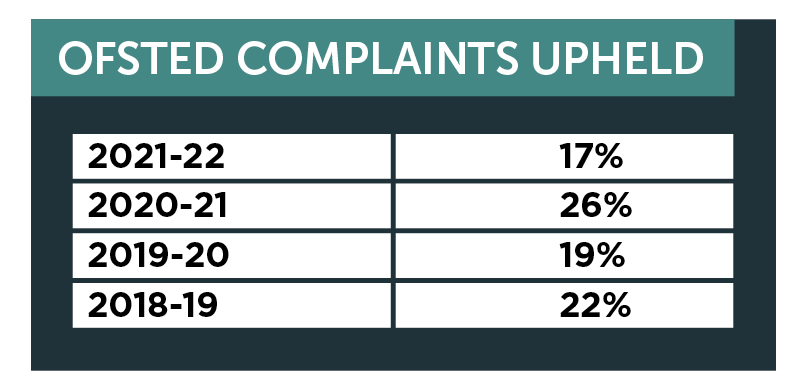Ofsted’s senior leaders have admitted their complaints policy “is not working” and is under review.
Officials have been told to make the process more human and less bureaucratic, FE Week’s sister publication Schools Week understands, following backlash from the sector.
During an invite-only briefing to academy trust leaders this week, the watchdog also revealed that its inspectors have been sent on “seeing the big picture” training after complaints about inconsistent grades.
Trust and training provider bosses have complained that some officials reached “over-zealous” judgements based on students’ remarks during inspections.
The rare admission from Ofsted has been praised in private by some education leaders, who feel it shows the watchdog is listening and taking action.
The percentage of complaints about inspections that were at least partially upheld fell to its lowest level in eight years last year.

Just 17 per cent of 718 complaints closed in the 2021/22 academic year had aspects upheld. This followed a record high of 26 per cent out of 320 complaints closed in the previous year, but this was heavily impacted by Covid.
The comments were made during a meeting with members of the Confederation of School Trusts. Large trust leaders heard from Ofsted officials Chris Jones and Lee Owston on Tuesday before the pair spoke again to about 400 CST members at meeting on Wednesday.
Trust leaders were told that the complaints process “is not working”, both for education providers and the inspectorate itself.
Ofsted officials are now reviewing their policy to see how they can improve it. One of the changes includes a new “enhanced oversight” process, Schools Week understands, which should lead to “problematic” inspections being picked up in real time, before issues arise with contentious judgments.
FE Week understands any changes to the complaints process would be implemented across all sectors, including schools and further education.
Caroline Derbyshire, chair of the Headteachers’ Roundtable, welcomed a review but said this should be shared with “everyone else in the profession”.
She said many heads believe that issues picked up during inspections can often be “dealt with”, but issues occurring post-inspection and requiring the complaints process to resolve “rarely result in a different outcome”.
The meeting followed CST sharing concerns about inspections raised by its members to the inspectorate last year.
One prevailing concern was about inspectors jumping to snap judgments based on what students say. Until recently, Ofsted inspectors have not had external results data to inform their judgment.
Trust leaders said a resulting over-focus on comments made during the student voice part of inspections – particularly relating to behaviour and derogatory language issues – were being given too much weight in final judgments.
The watchdog admitted to leaders there had been inconsistency in judgments across these areas.
Colleges and training providers have echoed these concerns experienced in schools to FE Week in recent years.
Academy trust leaders were told new inspector training started last week called “seeing the big picture”.
This is to ensure inspectors know the framework should not be taken verbatim, leaders were told, and that inspectors must not leap to snap judgments that any such issues are endemic in the school or provider.
A spokesperson for Ofsted said: “The landscape in which inspectors and leaders work is always evolving, which is why we run a continuous training programme for all our inspectors. We also make every effort to engage with people from the sectors we inspect and act on their feedback where we can.”
They added any “formal proposals for changes to our processes, such as complaints, will always be subject to wider consultation”.








The policy and process hasn’t changed but suddenly it’s no longer fit for purpose!
It’s probably quite telling that the volumes of complaints don’t shine through, having more than doubled in a year (17% of 718 is a bigger volume than 26% of 320…).
The real issue here is that providers are losing faith in Ofsted arriving at fair judgements and feeling they have to use the complaints process. The policy and process is not the problem, that’s just window dressing, and reviewing it will do little to restore confidence.
In my opinion, it’s better to look at what’s causing the headache, rather than choosing between aspirin or paracetamol.
In the days of the Adult Learning Inspectorate another inspector and I would analyse all the complaints made on an annual basis to see if there were any factors that could be improved to prevent repetition. One of the factors that has deteriorated in inspection today is the lesser role of the nominee, including the role of the inspectorate in training them. Nominees should be making concerns known about their inspection at the earliest possible time, not when their report is about to be published. Inspectors who investigate complaints should be doing so independently and not to protect Ofsted. Some of the letters to providers that outline reasons for not upholding complaints are frankly unbelievable. For example, post pandemic saying it was acceptable and normal practice for one inspector who had broken a leg to conduct the inspection from home rather than replace them with someone who could physically attend the provider and observe training. Or with a specialist apprenticeship provider who complained about lack of expertise of inspectors in both work-based learning and their vocational area to be told that being part of ONE work-based learning inspection was deemed by Ofsted to make them expert in the future. No wonder there are complaints when the composition of inspection teams takes no account of understanding what should be fundamental in assigning inspectors to teams, being able to make judgements about vocational skills development as part of the impact of the quality of education should be a minimum expectation of their inspection for every provider in planning, not a rarity.